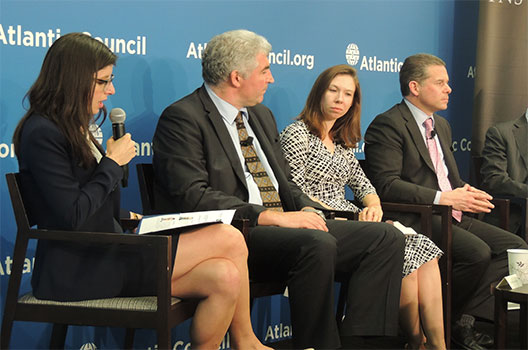 An independent judiciary and institutional transparency are necessary to root out corruption from government and businesses in Ukraine, according to a transnational criminal lawyer.
An independent judiciary and institutional transparency are necessary to root out corruption from government and businesses in Ukraine, according to a transnational criminal lawyer.
“The introduction of trial by jury is the surest guarantee of an independent court system and an independent court system is the ultimate antidote to corruption,” said Thomas Firestone, a former US Department of Justice official and current partner at Baker & McKenzie LLP.
“The courts are where the focus really has to be right now. The anti-corruption force has been working… [but the cases they bring to the courts] die in the courts because the courts are not reformed,” he added.
Firestone spoke at the Atlantic Council in Washington on June 22. Charles Davidson, executive director for the Kleptocracy Initiative at the Hudson Institute; Hannah Thoburn, research fellow at the Hudson Institute; and Marius Laurinavičius, senior resident fellow at the Center for European Policy Analysis, also participated in the panel discussion, which was moderated by Alina Polyakova, deputy director of the Dinu Patriciu Eurasia Center at the Atlantic Council.
Former Ukrainian President Viktor Yanukovych was ousted amid protests in Kyiv in February of 2014. Yanukovych was roiled in corruption scandals and widely known for cronyism.
Since Russia annexed the Crimean Peninsula in 2014, Ukraine has faced a protracted internal security challenge in the country’s eastern Donbas region where Russia has provided support to separatists. Continued civil unrest in the city of Donetsk has overshadowed the general economic recovery seen in the western parts of Ukraine.
In Ukraine’s most significant political shift since Yanukovych’s ouster, Arseniy Yatsenyuk resigned from the post of prime minister on April 12 amid public discontent and allegations of corruption. Volodymyr Groysman, who was elected prime minister by members of parliament on April 14, has pledged to combat corruption and undertake financial reforms.
Ukraine has a $40 billion bailout program from the International Monetary Fund, but the financial institution has threatened to halt funds if the government in Kyiv does not address the problem of corruption.
“There are some good signs now, particularly in the last two months, about the new government’s commitment to reforms,” said Polyakova.
While all of the panelists were cautious about Ukraine’s political future, they remained hopeful for what it could become and how it can get there.
“Law enforcement is in a very difficult position,” said Firestone.
Money laundering is significantly complex to prosecute, especially when attempting to find evidence in countries where kleptocracies are commonplace. “Transparency in society will raise the cost of being corrupt,” said Firestone.
Western partnerships with local reformers and the development of autonomous transparent institutions are needed, he added. These autonomous institutions can take many forms and some reform efforts have started to establish such agencies.
Due to the difficulty of prosecuting foreign corruption in the West, the majority of the work must fall on the shoulders of the home country, according to the panelists.
“The creation of the new national anti-corruption bureau and the selection process for the head of that agency was very transparent,” noted Firestone.
There are other institutions taking shape as well, such as the new asset recovery office, and a proposal to create an anti-corruption court.
In May, the Ukrainian Supreme Court upheld a ruling that stripped a member of parliament of immunity. There is more work to be done.
The consensus among panelists was clear: to undercut a kleptocracy reforms have to be instituted in Ukraine and in the West.
“We should help Ukraine by cleaning up our own act,” said Thoburn noting the inflows of dirty money into the United States and the potential for increased due diligence in the West. “We can help Ukraine by helping ourselves.”
Davidson contended: “We don’t have any policy tools; we don’t have any political theory to deal with this sort of a [political-economic] opponent.”
Firestone said: “The solution to this problem is always the same…the key is to create transparent institutions.”
Ukraine has been slowly charting a “new course.” Time will tell if this course is truly new or if it is just a reincarnation of past corrupt structures.
Julia Goldman is an intern at the Atlantic Council. You can follow her on Twitter @juliafgoldman1.
Image: From left: Alina Polyakova, deputy director of the Dinu Patriciu Eurasia Center at the Atlantic Council moderates a panel with Marius Laurinavičius, senior resident fellow at the Center for European Policy Analysis, Hannah Thoburn, research fellow at the Hudson Institute, Thomas Firestone, a former US Department of Justice official and current partner at Baker & McKenzie LLP, and Charles Davidson, executive director for the Kleptocracy Initiative at the Hudson Institute (not pictured). (Atlantic Council/ Sarah Straney)

